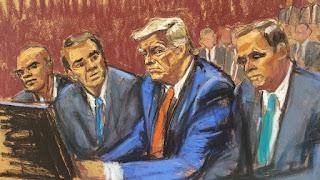
Donald Trump arraignment
As Donald Trump was arraigned in Miami yesterday, a question that has largely been unasked in the press, and probably in the public, came to the forefront -- at least in our minds. What was in those documents that Trump went to the trouble to take? And that leads to this associated question: Why did Trump want them? We will examine both of those questions in the next few days, starting with the first one, which Michael Tomasky, editor of The New Republic, addresses in an op-ed piece titled "The Trump Indictment: He's Had This Coming for Years." Writes Tomasky:
So Donald Trump has been indicted on 37 counts related to the classified documents he took to Mar-a-Lago, the charges reportedly including violation of the Espionage Act, making false statements, and obstruction of justice. Here are some other things we know, and some things we don’t know.
We know: This is historic. A never-before development for a 247-year-old democracy that has historically shown extraordinary deference to its presidents and ex-presidents. Trump and his defenders will twist this to suggest that he’s being attacked by a weaponized “deep state.” On planet Earth, it means that Trump singularly may have (even he is still presumed innocent!) violated laws and norms that everyone else followed.
We know: There is a real and undisputed record of Trump ignoring polite requests from the FBI to cooperate with their investigation into the matter, and later stonewalling the bureau when it decided it had to stop being polite.
We know: Despite Trump’s ridiculous protestations, his flagrant disregard of classification laws makes this case very different from those of Mike Pence and Barack Obama and, most saliently, Joe Biden. Biden’s situation has not yet been resolved, and that may take some time. But it seems likely that aides made some mistakes, and that’s what the probe will find, as it just did with Pence (I’m obviously no fan of Pence, but he, like Biden, is not a blatant lawbreaker). It will be important to keep pounding on this distinction, because Trump will hammer on it.
What do we not know? That is where some awfully big questions arise in this story:
We don’t know: what’s in the documents Trump kept.
We don’t know: how seriously he may have compromised U.S. intelligence gathering or sources.
We don’t know: when this may go to trial. (According to a number of reports, the trial is expected to begin next spring or summer.) In federal court in Washington, it takes a year. In south Florida, it could all happen much faster, on the “rocket docket.” The Manhattan judge on Trump’s first indictment, brought by Manhattan District Attorney Alvin Bragg, has already set a March 24 trial date—the thick of the later presidential primaries. What if this goes to trial around the same time? And remember, there is probably at least one more indictment coming, down in Georgia.
The key thing here is what’s in the documents. That’s where public opinion will say: Yes, this was a justified and necessary action by the federal government, or no, this is political. We know that about 35 percent of the country will view this as a witch hunt. I think a bit more, say 45 percent, will view it as justified. But that leaves 20 percent—a 20 percent that includes a lot of Trump voters. U.S. Special Counsel Jack Smith, who seems like one bad dude, knows what’s in the documents. I doubt he’d uncork an indictment if they featured talking points of condolence for the ambassador of Mongolia upon the death of the head of state.
In other words: What Trump did here is alarming, in terms of law and process. It’s also, maybe, an open-and-shut case. Former Attorney General Eric Holder told MSNBC’s Chris Hayes on Thursday night: “This is not a particularly difficult case.” That may be, legally. But politically, the American people will want to see that what Trump did was genuinely reckless. My bet is that Smith has that political horse sense. We’ll soon see.
That means this case is not just about what goes on within the four walls of a courtroom; public opinion matters. It also, Tomasky writes, is about Trump's troubled history:
But the bottom line here, and the One Big Thing that we know above all else? Donald Trump has had this coming. For years. This feels like justice knocking on the door.
It’s not just that he mocked and ignored the law for decades when he was in the skuzzy world of New York real estate, although it is that, to some extent. But it’s much more: He became, by means fair or foul, the president of the United States. Presidents have obligations to the people—all the people—that no one else in our system has. They have to, or certainly should, embody the best of our traditions. They should, like Biden does, genuinely and from the heart venerate the Americans who gave their lives for this country. I have very mixed feelings about a lot of our wars. But I want the president, who by the by is also the commander in chief, to humble himself before the memory of people who died in them. I do not want him to call them suckers and losers, as Trump did
And they have to revere the law. This has been a given, throughout our history—until Trump. Well, Dick Nixon, but once he was caught, he too admitted he was wrong and surrendered power. Only Trump knows and respects no law. He got away with that when he was in the inherently sleazy business of slapping his name on casinos. But the presidency of the United States is not an inherently sleazy business. Or at least it’s not supposed to be. Trump made it that. If there is any justice left in this country, he will die in a jumpsuit that matches his cratered skin.
